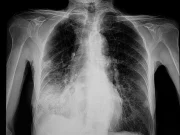Most frequent complication after atrial fibrillation was heart failure, with lifetime risk of more than 42 percent
By Elana Gotkine HealthDay Reporter
FRIDAY, April 19, 2024 (HealthDay News) — From 2000 to 2022, there was an increase in the lifetime risk for atrial fibrillation, according to a study published online April 17 in The BMJ.
Nicklas Vinter, M.D., Ph.D., from Aalborg University in Denmark, and colleagues examined how the lifetime risks for atrial fibrillation and complications after atrial fibrillation have changed over time (from 2000-2010 to 2011-2022) in a nationwide Danish population-based cohort study. Participants included 3.5 million individuals who did not have atrial fibrillation at 45 years or older; all 362,721 with incident atrial fibrillation, with no prevalent complications, were followed until incident heart failure, stroke, or myocardial infarction.
The researchers found that from 2000-2010 to 2011-2022, the lifetime risk for atrial fibrillation increased from 24.2 to 30.9 percent. The most frequent complication after atrial fibrillation was heart failure, with a lifetime risk of 42.9 and 42.1 percent in 2000-2010 and 2011-2022, respectively; the mean time lost was 14.4 years for heart failure versus no heart failure. The lifetime risks for stroke and myocardial infarction after atrial fibrillation decreased from 22.4 to 19.9 percent and from 13.7 to 9.8 percent, respectively. No evidence of a differential decrease was seen between men and women.
“Our novel quantification of the long-term downstream consequences of atrial fibrillation highlights the critical need for treatments to further decrease stroke risk as well as for heart failure prevention strategies among patients with atrial fibrillation,” the authors write.
Several authors disclosed ties to AstraZeneca and BMS/Pfizer; the study was partially funded by the Novo Nordisk Foundation.
Copyright © 2024 HealthDay. All rights reserved.



















